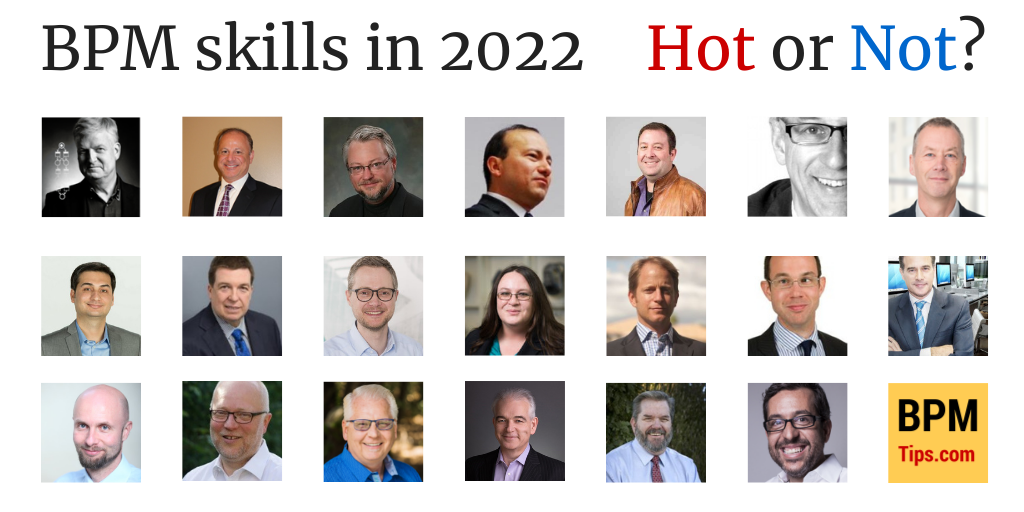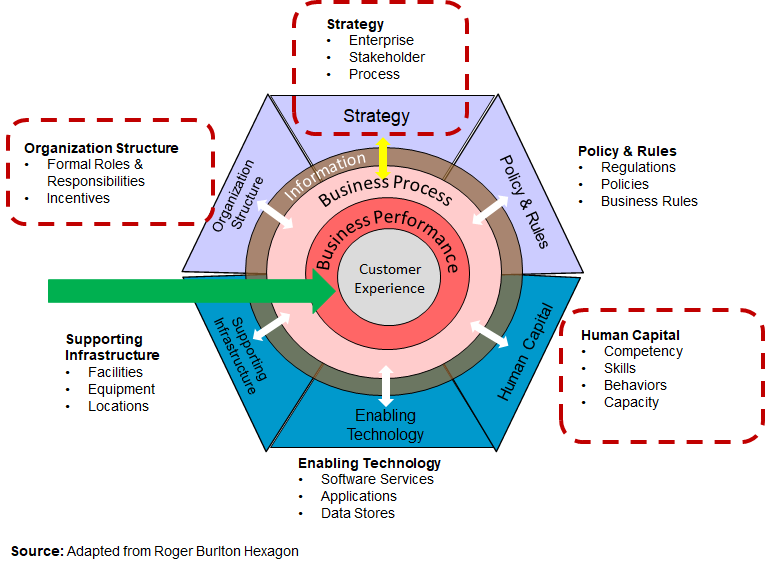Like in the past years I have a great pleasure to present you new post from the “BPM skills” series. You can read the past editions here.

Below you can read answers from 10+ BPM experts. You can either read everything or use the navigation below. Enjoy!
Wil van der Aalst
Tony Benedict
Lloyd Dugan
Marlon Dumas
Scott Francis
Ian Gotts
Paul Holmes-Higgin
Adeel Javed
Mathias Kirchmer
Mirko Kloppenburg
Holly Lyke-Ho-Gland
Brian Reale
Adrian Reed
Pedro Robledo
Tomislav Rozman
Serge Schiltz
Jim Sinur
James Taylor
Roger Tregear
Miguel Valdés-Faura
Which BPM skills will be hot in 2022
Now, let’s dive into the answers.
Prof. Wil van der Aalst
 Prof.dr.ir. Wil van der Aalst is a full professor at RWTH Aachen University, leading the Process and Data Science (PADS) group. He is also the Chief Scientist at Celonis, part-time affiliated with the Fraunhofer FIT, and a member of the Board of Governors of Tilburg University. He also has unpaid professorship positions at Queensland University of Technology (since 2003) and the Technische Universiteit Eindhoven (TU/e). Currently, he is also a distinguished fellow of Fondazione Bruno Kessler (FBK) in Trento, deputy CEO of the Internet of Production (IoP) Cluster of Excellence, co-director of the RWTH Center for Artificial Intelligence. His research interests include process mining, Petri nets, business process management, workflow automation, simulation, process modeling, and model-based analysis. Many of his papers are highly cited (he is one of the most-cited computer scientists in the world and has an H-index of 161 according to Google Scholar with over 121,000 citations), and his ideas have influenced researchers, software developers, and standardization committees working on process support. He previously served on the advisory boards of several organizations, including Fluxicon, Celonis, ProcessGold/UiPath, and aiConomix. Van der Aalst received honorary degrees from the Moscow Higher School of Economics (Prof. h.c.), Tsinghua University, and Hasselt University (Dr. h.c.). He is also an IFIP Fellow, IEEE Fellow, ACM Fellow, and an elected member of the Royal Netherlands Academy of Arts and Sciences, the Royal Holland Society of Sciences and Humanities, the Academy of Europe, and the North Rhine-Westphalian Academy of Sciences, Humanities and the Arts. In 2018, he was awarded an Alexander-von-Humboldt Professorship.
Prof.dr.ir. Wil van der Aalst is a full professor at RWTH Aachen University, leading the Process and Data Science (PADS) group. He is also the Chief Scientist at Celonis, part-time affiliated with the Fraunhofer FIT, and a member of the Board of Governors of Tilburg University. He also has unpaid professorship positions at Queensland University of Technology (since 2003) and the Technische Universiteit Eindhoven (TU/e). Currently, he is also a distinguished fellow of Fondazione Bruno Kessler (FBK) in Trento, deputy CEO of the Internet of Production (IoP) Cluster of Excellence, co-director of the RWTH Center for Artificial Intelligence. His research interests include process mining, Petri nets, business process management, workflow automation, simulation, process modeling, and model-based analysis. Many of his papers are highly cited (he is one of the most-cited computer scientists in the world and has an H-index of 161 according to Google Scholar with over 121,000 citations), and his ideas have influenced researchers, software developers, and standardization committees working on process support. He previously served on the advisory boards of several organizations, including Fluxicon, Celonis, ProcessGold/UiPath, and aiConomix. Van der Aalst received honorary degrees from the Moscow Higher School of Economics (Prof. h.c.), Tsinghua University, and Hasselt University (Dr. h.c.). He is also an IFIP Fellow, IEEE Fellow, ACM Fellow, and an elected member of the Royal Netherlands Academy of Arts and Sciences, the Royal Holland Society of Sciences and Humanities, the Academy of Europe, and the North Rhine-Westphalian Academy of Sciences, Humanities and the Arts. In 2018, he was awarded an Alexander-von-Humboldt Professorship.
WWW: http://www.vdaalst.com
WWW: LI profile
Twitter: @wvdaalst
What are the skills, techniques, behaviors, and attitudes that can help BPM practitioners create value for their organizations in 2022?
Data-science skills remain very important. However, it becomes increasingly clear that being an expert in machine learning is not enough to solve real-world challenges. These techniques are always applied in a particular context and need to be combined with domain knowledge. Process mining can facilitate the generation of machine learning problems to address real-world challenges. When being confronted with thousands of tables in an ERP system like SAP and additional data scattered over other home-grown information systems, one cannot start by creating a neural network. This can only be applied to very specific problems. However, with process mining you can regain control over the data and put this in a business context. Then you can generate your neural networks or other machine learning models to answer business questions. Process mining provided the missing link between model-based process analysis and data-oriented analysis techniques. Skills related to the combination of data science and process science have become more critical over time, and 2022 will be no exception.
The COVID-19 pandemic showed that accurate data are vital to managing operational processes. Global supply chains were taken by surprise, and vulnerabilities were exposed. Process mining can be used to create full transparency on what is happening in a supply chain and recommend actions.
What are the best resources to learn those skills? (e.g. books, articles, courses)
What is new in 2022 and very suitable for people starting in BPM and process mining is the course “Process Mining: From Theory to Execution” released in December 2021. The course is for free and can be found here: https://www.celonis.com/wils-process-mining-class/. This new process mining course aims to bridge the gap between the theory of process mining and the practical application using a commercial tool and real-life data sets. This 10-hour course “Process Mining: From Theory to Execution” can be taken at any time and provides software and data sets. After taking this compact course, participants will have learned about current trends in process mining and automation, know the key process discovery and conformance checking algorithms, and also study comparative and predictive process mining techniques allowing organizations to perform root cause analysis of performance and compliance problems.
Next to this course, my process mining book “Process Mining: Data Science in Action. Springer-Verlag, Berlin, 2016.” still seems the most obvious place to start to prepare for the convergence of data science and process science. The book is supported by the Coursera course with the same name, see https://www.coursera.org/learn/process-mining.
Which skills are no longer relevant or not practically applicable yet (hype)?
My answer is the same as last year; not much changed actually. I sense that most of the traditional skills are still relevant, but the emphasis has shifted from modeling and gathering requirements to more data-driven skills. Many people are obsessed with BPMN, DMN, and CMMN, living in an imaginary world very disconnected from reality. People stressing such standards without looking at the actual processes’ traces will not contribute to actual process improvements. Also, Artificial Intelligence (AI) and Deep Learning (DL) have been promising things that are simply unrealistic. The fact that neural networks work surprisingly well for some tasks does not imply that they can be applied to any problem, e.g., process management.
What is the role of process-related skills in the “new normal”?
Due to COVID-19, digitalization and new ways of working moved up in the list of priorities. Poor processes and outdated IT-infrastructures have been exposed, and people realize that it is time to rethink things and that changes are possible if there is a sense of urgency. Organizations built on spreadsheets and politics are unable to tackle the challenges related to COVID-19, e.g., tracking whether people get a third or fourth dose, ensuring that the right people get the vaccines, and detecting counterfeited or incorrectly handled vaccines. Due to my complex official first names (my full name is “Willibrordus Martinus Pancratius van der Aalst”), Covid-apps storing my COVID certificates cannot match my first two vaccinations with the third one, even not after reissuing the certificates three times.
Tony Benedict
 Tony Benedict is a Partner with Omicron Partners, LLC, a strategy advisory firm. He is a senior level operations executive best known for transforming organizations, improving operational excellence and profitability. Most recently, he served as Interim Vice President of Operations for Rising Pharma, managing all phases of complex $200M post-merger integration of 2 acquired companies (36 CMOs, 2 3PLs) within expedited timeframe, while concurrently launching a state-of-the-art pharma distribution center. Consolidated 3 ERP systems into a single SAP instance within 6 months. Benedict previously worked at HonorHealth as Vice President, Procurement and Supply Chain where he was responsible for over $600M in spend management. One of his accomplishments was in the restructuring of the procurement and supply chain organizations post-merger within 12 months and consolidating two ERP systems within 18 months while implementing $60M in cost reduction initiatives. Previously, he was Chief Information Officer, Vice President of Supply Chain for Tenet, and Vice President, Supply Chain, Vanguard Health Systems at Abrazo Community Health Network in Arizona.
Tony Benedict is a Partner with Omicron Partners, LLC, a strategy advisory firm. He is a senior level operations executive best known for transforming organizations, improving operational excellence and profitability. Most recently, he served as Interim Vice President of Operations for Rising Pharma, managing all phases of complex $200M post-merger integration of 2 acquired companies (36 CMOs, 2 3PLs) within expedited timeframe, while concurrently launching a state-of-the-art pharma distribution center. Consolidated 3 ERP systems into a single SAP instance within 6 months. Benedict previously worked at HonorHealth as Vice President, Procurement and Supply Chain where he was responsible for over $600M in spend management. One of his accomplishments was in the restructuring of the procurement and supply chain organizations post-merger within 12 months and consolidating two ERP systems within 18 months while implementing $60M in cost reduction initiatives. Previously, he was Chief Information Officer, Vice President of Supply Chain for Tenet, and Vice President, Supply Chain, Vanguard Health Systems at Abrazo Community Health Network in Arizona.
He is currently serving as President and Director, Board of Directors for the Association of Business Process Management Professionals International and is a co-author of the Business Process Management Common Body of Knowledge versions 2, 3 and the recently released version 4.
WWW: http://www.abpmp.org
WWW: LI profile
What are the skills, techniques, behaviors, and attitudes that can help BPM practitioners create value for their organizations in 2022?
I would add additional skills for systems thinking from an integration standpoint. What is meant by that? There are 10 core capability elements in every Enterprise. The term capability is used/misused way too often and tends to point to or focus on technology to much. While technology is one of the core capability elements, it is by no means the most important. At the center (of graphic) is customer experience, and surrounding that is business performance, then process and data. What guides the focus of those elements are Strategy, Organizational Structure and Human Capital. These 3 are the primary capability elements that you can control, where the most change will happen and represent what you can “mold” into whatever is needed to support achieving an optimal customer experience with high business performance. Process and Data are what PEOPLE WILL DO (AND USE) to achieve those outcomes/goals. Technology and Infrastructure are investments that are made as part of the overall plan, however, integrating the first 7 on the list is what creates the premium value. If you focus too much on one (technology) or two of the elements without integrating the others, then the risk of failure increases. 70% of transformation still fail even after 20 years of efforts.
Bottom line: Integrating the 10 core capability elements will be a critical skillset for BPM now and in the future in order to truly transform enterprises.
They are noted below:
1. Customer Experience,
2. Strategy,
3. Business Performance,
4. Business Process,
5. Information,
6. Organizational Structure,
7. Human Capital,
8. Supporting infrastructure,
9. Enabling Technology,
10. Policy & RulesHere’s the graphic:
Lloyd Dugan
 Lloyd Dugan is a widely recognized thought leader in the development and use of leading modeling languages, methodologies, and tools, covering from the level of EA and BA down through BPM, Case Management, and SOA. He specializes in the use of standard languages for describing business processes, systems, and services, particularly BPMN, CMMN, and DMN from the OMG. He has developed and delivered BPMN 2.0 training to the U.S. Department of Defense and large consultancies. He has nearly 30 years of experience with public and private sector clients, and has an MBA from the Fuqua School of Business at Duke University. He is an OMG-Certified Expert in BPM (OCEB) – Fundamental, a member of the Workflow Management Coalition and its BPSim Working Group, a member of the OMG’s BPMN Model Interchange Working Group (MIWG), and a Contributing Member (author), Meta Modeling and BPM-BA Alignment Collaboration Teams Member, and Advisory Board Member of the Business Architecture Guild. He is a frequent speaker at national and international conferences on BPM, BPMN, Case Management, SOA, and BA. He is a published author or co-author on BPM, BPMN, and BA. He serves as the Chief Architect for Business Process Management, Inc. (see www.bpm.com), for whom he delivers BPM-related training and client advisory services on BPM-related matters and technologies.
Lloyd Dugan is a widely recognized thought leader in the development and use of leading modeling languages, methodologies, and tools, covering from the level of EA and BA down through BPM, Case Management, and SOA. He specializes in the use of standard languages for describing business processes, systems, and services, particularly BPMN, CMMN, and DMN from the OMG. He has developed and delivered BPMN 2.0 training to the U.S. Department of Defense and large consultancies. He has nearly 30 years of experience with public and private sector clients, and has an MBA from the Fuqua School of Business at Duke University. He is an OMG-Certified Expert in BPM (OCEB) – Fundamental, a member of the Workflow Management Coalition and its BPSim Working Group, a member of the OMG’s BPMN Model Interchange Working Group (MIWG), and a Contributing Member (author), Meta Modeling and BPM-BA Alignment Collaboration Teams Member, and Advisory Board Member of the Business Architecture Guild. He is a frequent speaker at national and international conferences on BPM, BPMN, Case Management, SOA, and BA. He is a published author or co-author on BPM, BPMN, and BA. He serves as the Chief Architect for Business Process Management, Inc. (see www.bpm.com), for whom he delivers BPM-related training and client advisory services on BPM-related matters and technologies.
WWW: LI profile
What are the skills, techniques, behaviors, and attitudes that can help BPM practitioners create value for their organizations in 2022?
BPM practitioners should expand their understanding of related disciplines (including core concepts, modeling techniques, and methodologies), strive to do deeper and more meaningful (while still relatable) process modeling and BPM-related analyses, and continue to keep current with the impacts of emerging and evolving technologies. Regarding the first point, process modelers need to improve how they define scopes for processes and activities, which increasingly will require a technology-agnostic grounding in what are the outcomes that are produced or required by associated business capabilities. This is normally the purview of Business Architecture, but better alignment of BPM work with what the business does or needs requires an interdisciplinary approach to provide business or technology solutions of meaningful and enduring value. A Business Architecture standard from the OMG should start to emerge this year that will help make this happen, and BPM practitioners should engage with any outreach along these lines. Regarding the second point, integrated use of the languages available for modeling operational behaviors (DMN/CMMN/BPMN) is slowly but inevitably marching towards a critical mass of interest and practice. BPM work can (and should) be as demanding and rewarding as any engineering discipline, but this will only happen if BPM practitioners see their work as essential (and can prove it). Regarding the last point, RPA continues to evolve, but the 1st gen technologies of automating via emulation routine and repetitive work is already maxing out in impact, so the incorporation of machine learning and AI is up next as 2nd gen technologies to extend the value proposition of RPA.
What are the best resources to learn those skills? (e.g. books, articles, courses)
Really good BPM practitioners have – by training, experience, or both – the equivalent of advanced education (akin to an MBA here in the US). This requires a serious of purpose and a commitment to learn and to do, and to learn by doing. There are several websites that provide training (including bpmtips.com), some of which cost money while others are essentially free. Too many to list here, but I’ll mention (in completely self-serving way) BPM.com and BusinessProcessIncubator.com. Books and literature are also widely available and too numerous to mention. What I suggest is that one seeks out training and reference material, try to get a sense of (if not a listing of) the source material used in the training so that the curriculum is clear as well as what certification of having learned really means. Ultimately, this is more about what matters to the practitioner than to the market.
Which skills are no longer relevant or not practically applicable yet (hype)?
Facilitation skills are not, IMO, as much in demand anymore, as BPM practitioners have become an essential expertise that is hired from without or developed within or a bit of both. In other words, BPM practitioners are increasingly expected to be THE experts to solve problems, and to do so largely on the largess of their own skills, experience, and training. This means that BPM practitioners need to be able to go the extra mile in divining the root causes of problems and to craft impactful solutions to those problems, as the client will largely see this as outsourced endeavor. This becomes high-risk, high-reward for those brave enough to keep doing it. Grounding in applied operational management theory or industrial engineering remain, IMO, essential, but they continue to be hard and/or expensive to come by. Hopefully this can change with greater access to resources.
How did covid-related changes in the business environment impact the work of BPM people?
IMO, COVID has broken the back of the old employment model that has governed how staff engage to delivery value to or on behalf of the business. We know all CLEARLY know that remote work is not only doable but can be effective. We also CLEARLY know that only knowledge workers can be the beneficiaries of this realization, as front-line service workers, first responders, and other workers who HAVE to be somewhere physically cannot. What this means for the BPM practitioner is that knowing how to outfit an effective remote workforce is now a critically needed solution for high-knowledge situations, but solutions for other workers are still needed that better enable high-touch situations. Otherwise, class divisions that are already bad will get worse. BPM should not add to this inequality but should work to bridge it, realizing that solutions have consequences. It is hard to imagine how any of these realizations would have happened without COVID exposing these things. As a society, as a species, we cannot go back to the past. We do not have that luxury in a post-pandemic world.
Prof. Marlon Dumas
 Marlon Dumas is Professor of Information Systems at University of Tartu, Estonia, and co-founder of Apromore Pty Ltd, a company dedicated to developing and delivering open-source process mining solutions. He is currently recipient of an Advanced Grant from the European Research Council with the mission of developing algorithms for automated identification and assessment of business process improvement opportunities from event data. His research in the field of business process management and process mining has led to numerous research publications, several US/EU patents, and a textbook (Fundamentals of Business Process Management) used in over 250 universities worldwide.
Marlon Dumas is Professor of Information Systems at University of Tartu, Estonia, and co-founder of Apromore Pty Ltd, a company dedicated to developing and delivering open-source process mining solutions. He is currently recipient of an Advanced Grant from the European Research Council with the mission of developing algorithms for automated identification and assessment of business process improvement opportunities from event data. His research in the field of business process management and process mining has led to numerous research publications, several US/EU patents, and a textbook (Fundamentals of Business Process Management) used in over 250 universities worldwide.
WWW: WWW
WWW: LI profile
What are the skills, techniques, behaviors, and attitudes that can help BPM practitioners create value for their organizations in 2022?
The need for agility and adaptability has clearly increased during pandemic times. Organizations are pushed hard to continuously monitor their processes, and to detect, preempt, and react to changes.
Not surprisingly, we see an increased attention to process mining and data-driven process management. Managers need full transparency into their process to understand how to surgically intervene in order to continuously adapt to changes in customer demand and expectations, to workforce behavior, and to other changes in the business environment. They also need to predict what will be the impact of internal and external changes, such as the impact of reduced workforce availability, supply chain disruptions, or increasing or decreasing demand for different types of products. Because of this, managers are seeing value in deploying digital twins of the organization, and particularly digital process twins.
Against this backdrop, we are seeing increased adoption of predictive and prescriptive analytics technology, which allow operational managers and process workers to foresee and to preempt issues in their processes (e.g. out of stock situations, customer churn). As we move forward inside the 2020s, predictive and prescriptive analytics, and other AI technology, will mature and drive increased business value.
What are the best resources to learn those skills? (e.g. books, articles, courses)
A data-driven company by Richard Benjamins gives a lightweight overview of what it means to run a data-driven company.
To learn from what other successful companies are doing, I recommend the book of “Business Process Management Cases” by Jan vom Brocke, Jan Mendling and Michael Rosemann, which is now available in two volumes.
To keep up with ongoing technology developments and news on process automation (but also BPM more generally), I recommend following the Linkedin account of Tolani Jaiye-Tikolo.
For Spanish-speakers, I recommend Coursera’s data-driven process optimization course in Spanish “Analítica de Procesos: Optimización desde los Datos”: https://www.coursera.org/learn/analitica-procesos-optimizacion-desde-datos
Which skills are no longer relevant or not practically applicable yet (hype)?
In an era of continuous change, there is a less pressing need to solidify and standardize processes. As a result, process standardization skills are less in vogue than they were a few years ago. This does not mean, however, that the need for these skills is gone forever. Not at all. I bet we will see them back on the table soon enough.
How did covid-related changes in the business environment impact the work of BPM people?
Covid has had two major effects. First it has made flexible and remote work a norm. Second, it has created a continuous need for adaptability. Both of these trends have heighten the need for business transparency methods and technology, including process mining and digital process twins.
Scott Francis
 Scott Francis is CEO and Co-Founder of BP3, a BPM specialist firm focused on accelerating process innovation for customers. Scott and his team have grown BP3 into a Leader in Forrester’s Wave for BPM Services Providers, a top 10 Company in Fortune’s Great Places to Work, a top 10 company in Austin’s Fast 50, and to 120 employees worldwide. Scott is a speaker at conferences such as: bpmNEXT, BPMPortugal, and BPMCAMP, and is the primary author of BP3’s blog.
Scott Francis is CEO and Co-Founder of BP3, a BPM specialist firm focused on accelerating process innovation for customers. Scott and his team have grown BP3 into a Leader in Forrester’s Wave for BPM Services Providers, a top 10 Company in Fortune’s Great Places to Work, a top 10 company in Austin’s Fast 50, and to 120 employees worldwide. Scott is a speaker at conferences such as: bpmNEXT, BPMPortugal, and BPMCAMP, and is the primary author of BP3’s blog.
WWW: http://www.bp-3.com
WWW: LI profile
Twitter: @sfrancisatx
What are the skills, techniques, behaviors, and attitudes that can help BPM practitioners create value for their organizations in 2022?
Let’s assume this person *already* knows BPMN, knows a value stream map from a failure mode effects analysis, and they at least know when to ask for help from someone who is a six sigma guru. I think in 2022, if you’re doing process work, you need to look at adding some skills to your repertoire. First off, if you don’t know RPA yet you should learn how to do RPA with one of the top tools in the space. Each vendor has good free educational resources. Second, learn about Design with a capital D. Not “process design” – but Design. It will help change your perspective on how to build great process solutions. Third, if you aren’t facile with a programming language, take time to get passably familiar with one – javascript or python for example. Both of these are general utility-like languages with lots of use cases. Fourth, if you have the above down already, time to look at expanding your knowledge of data and analysis with R, or AI by going deep on AWS or Google or Azure services… That should be a good start for the new year! While you’re at it, read 20+ books to keep sharp! 🙂 fiction, nonfiction, business – I don’t think it matters, they all help you improve your self, develop empathy and perspective. In a time when we can’t travel (much), reading is the next best thing.
What are the best resources to learn those skills? (e.g. books, articles, courses)
Most of the software vendors provide great educational content online for the self-directed learner. We’ll be offering educational options for clients this year for our own take on what matters most! This kind of offering will be helpful to clients who want to make sure their teams are all on the same page – getting the same background and educational framing to support working together on process and automation projects.
How did covid-related changes in the business environment impact the work of BPM people?
The main change is that our clients and BP3 are doing our work from anywhere now. This was true before – but with many clients wanting a certain amount of time in the office together. Now those requirements have lapsed and we do our work from quite literally anywhere, and do our connecting on Zoom and Slack and other collaboration tools.
We’ve had to learn new ways to collaborate on process designs and software design – but equally, it was needed – because even pre-pandemic our clients have national and global teams that need to be included in the process. So we see it as progress. Now the question for 2022 and 2023 – is how do we add back the more personal human connection, while retaining the benefits of working together from anywhere in the world?
Ian Gotts
 Ian is a founder of Elements.cloud, tech advisor, investor, speaker and author.
Ian is a founder of Elements.cloud, tech advisor, investor, speaker and author.
Elements.cloud helps customers clean-up, document and build their app implementations, focused on Salesforce. But valid for any low code app platform.
WWW: https://medium.com/@Q9ELEMENTS
WWW: elements.cloud
WWW: LI profile
Twitter: @iangotts
What are the skills, techniques, behaviors, and attitudes that can help BPM practitioners create value for their organizations in 2022?
1. COVID accelerated digital transformation in every organization. In the early days of COVID, a cobbled-together on-line offering was good enough, but now having an online offering is table stakes. The differentiator is execution. Can your back office deliver the promise your website is making? That requires end to end process thinking, definition and delivery through a combination of technology and people. And that means process is at the heart.
2. Low-code apps showed how you could hack together an app really quickly. That was fine when it was tactical, small or self contained. If it wasn’t right, then throw it away or tweak it. But now low-code is being used for strategic systems. Therefore we need to reinforce (or reinstate) the value of business analysis before you start building. That will be a challenge as it feels like it is slowing down innovation. But what it is doing is removing rework. It is delaying app development, but it ultimately accelerates time to value because you are building what the business needs – first time.
What are the best resources to learn those skills? (e.g. books, articles, courses)
Spending time doing the upfront analysis is called “Shift Left”. Shift Left means find the problems earlier, when they are cheaper to fix.
There is no shortage of information on how to capture requirements, map processes and write user stories. We’ve developed courses based on 20+ years experience in our Academy.elements.cloud
Also Salesforce has launched a business process mapping course as part of its certified architects program, but it is relevant to any process practitioner https://elements.cloud/2020/12/18/salesforce-training-course-endorses-upn/
Which skills are no longer relevant or not practically applicable yet (hype)?
We need on-line actionable diagrams embedded inside apps. So flowcharts are finally dead. And this is why https://elements.cloud/2020/06/08/the-evolution-of-process-diagramming-i-e-why-flowcharts-are-so-1980s/
How did covid-related changes in the business environment impact the work of BPM people?
See ans to Q1
Paul Holmes-Higgin
 Dr Paul Holmes-Higgin, Chief Product Officer and co-founder of Flowable. Previously, as co-founder and CPO of Alfresco he brought Activiti to the fore of the company’s innovation. A long-time Open Source advocate, he believes it still has an important role to play in making innovation more widely available. His PhD and background in AI gives him a deep understanding of the opportunities and realities of Machine Learning. He sees innovation around the standard models of BPM as the best way to bring together his passions for user-centred software and intelligent automation in today’s highly dynamic business and social environment.
Dr Paul Holmes-Higgin, Chief Product Officer and co-founder of Flowable. Previously, as co-founder and CPO of Alfresco he brought Activiti to the fore of the company’s innovation. A long-time Open Source advocate, he believes it still has an important role to play in making innovation more widely available. His PhD and background in AI gives him a deep understanding of the opportunities and realities of Machine Learning. He sees innovation around the standard models of BPM as the best way to bring together his passions for user-centred software and intelligent automation in today’s highly dynamic business and social environment.
WWW: https://flowable.com
WWW: LI profile
Twitter: @paulrhh
What are the skills, techniques, behaviors, and attitudes that can help BPM practitioners create value for their organizations in 2022?
With our customers, we’re seeing a move towards resolving end-to-end (E2E) automation problems, rather than point solutions – though point solutions may make up part of that E2E result. There’s a lot of focus on low-code, but not in a compartmentalized way it might be expressed by the market, which often separates no-code, low-code and pro-code. What businesses are asking for is the optimal approach for the problem at hand, and that changes as a project or solution evolves. We’re seeing no-code being heavily used for prototyping and departmental solutions, but then low-code when there’s more complexity (through scale, user experience, or integration), with pro-code being needed at the extremes of this (where time and money are more often acceptable). So, platforms or combinations of tools that facilitate the spectrum of no-low-pro-code solutions are attractive (by the way, we call it flow-code for short, but we would, wouldn’t we!).
One of the key capabilities that this end-to-end focus has highlighted is the easy assimilation and distribution of data. For me, business automation is all about the flow of data from and to systems and humans. Generally, in the process market we’ve been focused on process, case and decisions/rules – the “triple crown”. Data really belongs at the same level of importance. The ability to connect with databases and web services in no-code and low-code approaches is critical to delivering on the E2E no-low-pro-code opportunity. In my mind, data is the raw material extracted from systems or people to create business value. Data needs to flow through a number of stages of refinement, enrichment and evaluation to create an effective end-to-end solution. Ideally, you want the best of breed systems involved in the automation and life-cycle of the solution. That might be for process mining, machine learning, IoT and so on, or devices connecting people through chat, voice, video or augmented reality.
What are the best resources to learn those skills? (e.g. books, articles, courses)
Doing it! There’s only so much you can learn on specific technologies or techniques when it comes to applying them together in an E2E automation solution. I still believe CMMN as an open standard offers a great way to model automation end-to-end, and there’s books, articles and open source tools that can support learning of that.
Which skills are no longer relevant or not practically applicable yet (hype)?
End-to-end business automation has a couple of areas where practical reality is still behind expectations. First, Robotic Process Automation: the RPA vendors don’t seem to have grasped that their current technologies don’t meet the needs of E2E. I expected acquisitions to happen in the last year to address this, but nothing significant happened.
Second, AI/ML is still something people are hyping without telling the full story and implications. We’re starting to see this in some of the no-code, AI-driven process automation tools that are being promoted. At the end-to-end business level (and many other places), AI needs to be explainable, otherwise there’s a real risk of bias of some form or other. At a macro-level, AI that generates BPMN, CMMN or DMN is good, as a human can inspect and adjust the machine learnt logic. At a micro-level, black box machine learning is very useful, but can’t be taken as magic – its implications need to be understood in the context they’re used.
How did covid-related changes in the business environment impact the work of BPM people?
These BPM people suddenly had many more projects they were asked to deliver on – and in shorter timescales! This really accentuated the no-code and low-code buzz that was already starting to happen. For some companies, they’d already started adopting and adapting their approach to process-rich automation, so it just accelerated that. For others, the covid situation drove them to introduce formal processes to adjust to remote and auditable working; also to consider process agility for more frequent absence of staff; and automation adaptability to even more rapidly changing markets and regulations.
Adeel Javed
 Adeel Javed is an intelligent automation architect, an author, and a speaker. He helps organizations automate work using low-code, business process management (BPM), robotic process automation (RPA), analytics, integrations, and ML. He loves exploring new technologies and writing about them. He has published two books with Apress, “Building Arduino Projects for the Internet of Things: Experiments with Real-World Applications” and “Robotic Process Automation using UiPath StudioX: A Citizen Developer’s Guide to Hyperautomation”. He shares his thoughts on various technology trends on his blog (adeeljaved.com).
Adeel Javed is an intelligent automation architect, an author, and a speaker. He helps organizations automate work using low-code, business process management (BPM), robotic process automation (RPA), analytics, integrations, and ML. He loves exploring new technologies and writing about them. He has published two books with Apress, “Building Arduino Projects for the Internet of Things: Experiments with Real-World Applications” and “Robotic Process Automation using UiPath StudioX: A Citizen Developer’s Guide to Hyperautomation”. He shares his thoughts on various technology trends on his blog (adeeljaved.com).
WWW: https://adeeljaved.com
WWW: LI profile
Twitter: @processrambling
What are the skills, techniques, behaviors, and attitudes that can help BPM practitioners create value for their organizations in 2022?
In my opinion, understanding of what I refer to as the Automation Stack will be very important. While orchestration is still the central component of this stack, we need to think beyond the traditional human-input tasks, and API-based system integrations. I would recommend exploring these areas.
• Robotic Automation: The hype might no longer be there, but RPA is still a necessity. The ability to integrate with legacy systems that do not support APIs, or systems that are hard to integrate with (due to numerous constraints) is extremely important to digitalize processes.
• Intelligent Document Processing: Still a bit clunky, but the ability to process documents intelligently can reduce a lot of manual work.
• Next Best Action: Most platforms now connect with some sort of AI services that can be used to augment human tasks with next best action recommendations.
• Process Mining: Not there yet, but it is definitely coming up, and is a good skill to get into now.
• Agile: Nothing new, but the ability to better breakdown process automation projects into user stories is still a challenge, so mastering this skill will be very beneficial.
Which skills are no longer relevant or not practically applicable yet (hype)?
I do believe that most of the standards (such as BPMN, CMMN, DMN) have not really been adopted really well, and I do not see them being very relevant at this point.
Dr. Mathias Kirchmer
 Dr. Kirchmer is an experienced practitioner and thought leader in the field of Business Process Management (BPM) and Digital Transformation. He co-founded BPM-D, a consulting company focusing on delivering performance improvements and appropriate digitalization by establishing and applying the discipline of BPM. Before he was Managing Director and Global Lead of BPM at Accenture, and CEO of the Americas and Japan of IDS Scheer, known for its ARIS Software.
Dr. Kirchmer is an experienced practitioner and thought leader in the field of Business Process Management (BPM) and Digital Transformation. He co-founded BPM-D, a consulting company focusing on delivering performance improvements and appropriate digitalization by establishing and applying the discipline of BPM. Before he was Managing Director and Global Lead of BPM at Accenture, and CEO of the Americas and Japan of IDS Scheer, known for its ARIS Software.
Dr. Kirchmer has led numerous transformation and process improvement initiatives in various industries at clients around the world. He has published 11 books and over 150 articles. At the University of Pennsylvania and at Widener University he has served as affiliated faculty for over 15 years. He received a research and teaching fellowship from the Japan Society for the Promotion of Science.
WWW: LI profile
WWW: http://bpm-d.com
Twitter: @mtki2006
Business Process Management – Predictions for 2022
Business Process Management (BPM) continues to drive value from digital transformation and becomes the management discipline to keep the transformation journey going – while getting digitalized itself. Here are four key trends and predictions I see for 2022:
• Process-led Digital Transformation: Digital technologies delivers value through new and enhanced business processes. Therefore, digital transformation is best organized through a process lens. The discipline of business process management (BPM) enables process-led digital transformation using an appropriate “process of process management”. Organizations will keep on increasing their focus on establishing and applying the required BPM-Discipline as “value-switch” for the digital world.
• Digitalization of the Process of Process Management: To achieve the agility and effectivity required in a digital world, business process management (BPM) goes through a digital transformation itself. The Process of process management is implemented through an integrated set of digital tools, such as process prioritization tools, process modelling and repository applications, or process mining environments. These tools are increasingly integrated with underlying process automation platforms and software applications. Organizations select their “ERP for BPM” and implement it in an outcome-driven way in the context of specific improvement and transformation initiatives. This value-driven digitalization of BPM leads to rapid business benefits while building a sustainable process management capability; the BPM-Discipline.
• Innovation through Business Process Management: Business Process Management (BPM) is not just applied to deliver efficiency to drive innovation. It is used to achieve process innovation, leveraging techniques like customer journey mapping or software-based reference models and the definition of related process scenarios. This serves to identify, design, and realize new and significantly enhanced processes, fast and reliably. BPM allows to apply design thinking pragmatically and action oriented. In addition, the BPM-Discipline is used to establish and manage a suitable innovation process, realizing goals like an increased number of high-quality innovation projects, reduced time-to-market, reliable cycle time estimations, or an early identification of potential roadblocks.
• Governance for the Digitalization and Transformation Journey: Digital transformation is not just a project or program. It is an ongoing journey. The right business process management (BPM) discipline helps to organize this journey. It defines strategy-based priorities, manages the resulting project portfolio, runs the process transformation initiatives, and realizes the value of those projects. BPM organizes the required process governance to align people and digital technologies to achieve best value for the organization. Organizations establish the BPM-Discipline to master the digitalization and transformation journey.
Highly specialized consulting organizations, such as BPM-D and Scheer Management, industry organizations, for example, ABPMP and the BPM Institute, or academic institutions, e.g. Widener University and the University of Pennsylvania, provide focused education regarding those trends. They also offer readings and eLearning opportunities though their web pages. Software vendors, such as SAP/Signavio, Software AG/ARIS or Celonis, provide tool-specific training.
Traditional, manually applied process excellence tools and approaches continue to lose in significance. They increasingly struggle to follow the pace of change in a digital world. However, the basic thinking that approaches like Lean or Six Sigma provide is still true and valid. It just must be incorporated in a modern, digitally enabled process management discipline.
The pandemic has accelerated and shaped the development of this BPM-Discipline. It has pushed process management practitioners to adjust and digitalized their working style quickly. This resulted, for example, in effective remote process capture and design sessions where the related process models are developed live in virtual sessions, leveraging user friendly modelling and collaboration tools. Process mining approaches are used more widely, enabled through the higher degree of process automation. The required remote work of process practitioner encourages the more formal definition of the “process of process management” with its organizational structure. All in all, Covid has helped to transform BPM even faster into a value-driven and digitally enabled process management discipline.
Mirko Kloppenburg
 Hi, I am Mirko Kloppenburg. Together with my wife and our two daughters, I live in Hamburg, Germany.
Hi, I am Mirko Kloppenburg. Together with my wife and our two daughters, I live in Hamburg, Germany.
For more than 20 years, I have been working for Lufthansa Group in various process management positions. Currently, I am heading the Methods & Tools team for Process Excellence and we are providing process management expertise to the whole Lufthansa Group.
In parallel to my job at Lufthansa, I founded NewProcessLab.com in 2021. NewProcessLab.com is a platform to build a community, to perform experiments, and to share experiences along the New Process approach. New Process is a symbiosis of New Work and BPM and aims to rethink processes. It adds a human-centric mindset to the already proven BPM tools and methods we know from the past.
The year 2022 will bring a big change for me personally, as I will be leaving Lufthansa to concentrate fully on New Process. So, I am looking forward to an exciting year and I would like to invite you to join the New Process community, to build the future of process management, and to rethink processes together!
WWW: NewProcessLab.com
WWW: LI profile
Twitter: @MirkoKBurg
What are the skills, techniques, behaviors, and attitudes that can help BPM practitioners create value for their organizations in 2022?
For me, the core skill to make a valuable contribution to an organization with BPM is clearly the knowledge on how to implement a structured process management process. By this I mean a procedure for translating the organization’s business strategy into specific processes and bringing them to life. I would go even further here and recommend a holistic transformation approach that considers the purpose of the organization and the individual processes to truly inspire people.
Inspiring people to create excellent processes is one of the New Process principles that are integrated into the New Process Life Cycle. The New Process Life Cycle is an approach to implement exactly the mentioned capabilities in an organization. It is about putting people at the center of process management, trusting them, empowering them, and taking their individual strengths and needs into account.
By the way, New Process can also be combined very well with Process Mining, which is certainly a topic mentioned by many for 2022. Process mining can be used to identify improvement potentials within process strategy and process design phase of the New Process Life Cycle. To interpret the results and derive measures, it is important to also involve the people who work in the process. After all, they are the true experts on the process, and this should be used to further develop the process and implement the changes in a sustainable manner. #NewProcess 🙂
And there is another thing that I expect to be an emerging theme in 2022: We will see more and more of the tools and methods used by influencers applied to specific business processes or to BPM in an organization. Process Influencers, so to speak. People who specialize in creating content for the respective process community within an organization: Process related podcasts, videos, events…
I see a great potential to use these influencer tools and methods in BPM and thus to support the transformation process. To push this approach of inspiring people further, I will certainly start some activities.
What are the best resources to learn those skills? (e.g. books, articles, courses)
You will find a lot of information about New Process on NewProcessLab.com. There is a toolbox with methods and tools along the New Process Life Cycle available.
But of course, I don’t just want to advertise on my own behalf. Beyond New Process, I discovered the “Mining Your Business”- Podcast a few months ago and I can highly recommend the interviews of Patrick Bogner and Jakub Dvořák. – By the way, episode 22 of their podcast series is dealing with New Process, too. 🙂
Which skills are no longer relevant or not practically applicable yet (hype)?
For me, everything that has to do with “higher, faster, further” is obsolete. In my view, it is time to push human-centric BPM instead. I am so bored of budget discussions and counting FTEs. I wish we can make a positive impact with BPM that really touches and inspires people.
How did covid-related changes in the business environment impact the work of BPM people?
Business topics can be discussed remotely without any problems, but interpersonal topics often get missed out. That’s why I’m really hoping to be able to hold workshops in person again soon.
As long as this is not the case, I would especially recommend following the New Process Principles and to focus on the people working in and on the process. #NewProcess
Holly Lyke-Ho-Gland
 Building on more than 10 years of business research and consulting experience, Holly Lyke-Ho-Gland is a principal research lead who conducts and publishes APQC research on process management and improvement, quality, project management, measurement, and benchmarking for APQC’s Process and Performance Management research team. Her research supports APQC members and clients across disciplines and centers on helping professionals and project managers solve business problems with strategy, process and measurement.
Building on more than 10 years of business research and consulting experience, Holly Lyke-Ho-Gland is a principal research lead who conducts and publishes APQC research on process management and improvement, quality, project management, measurement, and benchmarking for APQC’s Process and Performance Management research team. Her research supports APQC members and clients across disciplines and centers on helping professionals and project managers solve business problems with strategy, process and measurement.
Holly regularly partners with other APQC research leads to look at improving the end-to-end business processes in areas such as procure-to-pay or order-to-cash where true improvement rests in the entire process versus one functional department. On a biannual basis, she conducts APQC’s extensive research survey and report on The Value of Benchmarking as well as annual surveys and reports on how organizations adopt and use the Process Classification Framework®.
WWW: https://www.apqc.org
WWW: LI profile
Twitter: @hlykehogland
What are the skills, techniques, behaviors, and attitudes that can help BPM practitioners create value for their organizations in 2022?
Knowledge management is rapidly moving beyond a nice to have skill for BPM practitioners. Processes by themselves—even augmented through technology—will only take organizations so far. Instead, they need to be connected to all the relevant process knowledge (e.g., business rules, best practices, and expertise). Over the last couple of years, have seen the divide between process and knowledge disciplines shrink. Knowledge management professionals are partnering with BPM professionals to integrate process into their work. They are also partnering so they can help connect employees to the knowledge they need in the flow of their work. While BPM professionals want to ensure they capture, curate, and ensure accessibility of all relevant process knowledge. Hence, why these days it’s much more common to see BPM teams that will include a knowledge management expert to help them manage their process content. Furthermore in research on productivity, we found that process and knowledge (preferably working together) are vital for virtual work environments.
So much of BPM work relies on people. Hence facilitation and relationship building skills are more important than ever. The virtual nature of BPM work requires professionals to not only re-hone their facilitation skills but become much more purposeful in building relationships with people within the business.
What are the best resources to learn those skills? (e.g. books, articles, courses)
There are a lot of great books and resources out there on knowledge management:
• APQC: Knowledge Management
• KM World
• New Edge in Knowledge: How Knowledge Management is Changing the Way We do Business by Carla O’Dell and Cindy Hubert
• Thinking for a Living: How to Get Better Performances And Results from Knowledge Workers by Tom Davenport
Which skills are no longer relevant or not practically applicable yet (hype)?
Skills don’t ever really lose their applicability; they just evolve and serve as the foundations for new skills.
How did covid-related changes in the business environment impact the work of BPM people?
Covid-related changes had two big impacts on the work of BPM people. First it has helped bring process work to the forefront. Though teams still conduct a lot of work looking at cost and productivity improvements, they are also being tapped for an array of strategic work—supporting the execution of strategic objectives, organizational transformation, and large-scale technology implementations.
The second major impact is the ubiquitous of technologies. Gone are the days of a group of SMEs huddled together in a workshop using post its or whiteboards. Today BPM professionals are deft at leveraging collaboration tools—to substitute the conference rooms—and digital whiteboards to map out processes. Not only has Covid made technologies more necessary, but it has also spurred vendors to make them easier to use. In our recent priorities survey BPM professionals indicate that collaboration platforms, data visualization tools, and automation are the top technologies intrinsic to their process work.
Brian Reale
 Brian Reale is a serial entrepreneur. Brian founded a telecommunications company in 2000 called Unete Telecomunicaciones which provided, voice, data, and satellite services in Latin America. Brian sold Unete to a publicly traded US telecom company in 2000. Brian was also the co-founder of Spotless LLC, an entertainment technology company that developed projection mapping technology for major live entertainment industries.
Brian Reale is a serial entrepreneur. Brian founded a telecommunications company in 2000 called Unete Telecomunicaciones which provided, voice, data, and satellite services in Latin America. Brian sold Unete to a publicly traded US telecom company in 2000. Brian was also the co-founder of Spotless LLC, an entertainment technology company that developed projection mapping technology for major live entertainment industries.
Brian has been involved in the workflow and BPM industry since he co-founded ProcessMaker in 2000. ProcessMaker is a leading open source BPM suite which has just released its 4th generation product – a modern lightweight BPM designed for both human tasks and microservices orchestration. The ProcessMaker BPMS has been recognized with numerous awards and pushes the bounds of BPM with a fundamental belief that process management can be simple, elegant, and easy to use.
Brian graduated magna cum laude from Duke University in 1993 and was awarded a Fulbright scholarship in linguistics in Ecuador in 1994.
WWW: https://www.processmaker.com
WWW: LI profile
Twitter: @breale
Twitter: @processmaker
What are the skills, techniques, behaviors, and attitudes that can help BPM practitioners create value for their organizations in 2022?
I tend to like the Gartner concept of the “Composable Business” when thinking about BPM. The idea of monolithic iBPMs suites is basically dead. Sophisticated companies want to use a composable architecture to build around a best in class process orchestration engine. They want to be able to choose their low code front end technologies, their favorite RPA and iPaas vendors, plugin in a best in breed document storage, and use AI/ML in a variety of places. In one word, customers want freedom. I think that BPM practitioners need to embrace this freedom and become well versed in many different plugin technologies.
What are the best resources to learn those skills? (e.g. books, articles, courses)
The best resources are free-trials, online tutorials, and vendor documentation. Practitioners need to test and try before they buy. The absolute best resource for this is Github. Fork some code and implement something yourself. Demand openness from your vendors.
Which skills are no longer relevant or not practically applicable yet (hype)?
Small data. In other words, you really need big data skills to make sense of where all technology trends are leading today. AI and ML will soon be making most decisions for us in most systems. Practitioners need to really understand these trends and where they are heading.
How did covid-related changes in the business environment impact the work of BPM people?
The real change from COVID is the change to the labor force. The fact is that it is now very difficult to find the right people with the right skills for many types of jobs. As a result, the demand for automation has sky-rocketed. We will look back in 5 years and see that the Great Resignation really was the moment of the Great Start for AI/ML. The one is the exact replacement of the others. We have always talked about AI & ML replacing humans. It makes perfect sense that this really started happening in earnest during the year that all the humans decided to stop working. It is sad, but true.
Adrian Reed
 Adrian Reed is a true advocate of the analysis profession. In his day job, he acts as Principal Consultant and Director at Blackmetric Business Solutions where he provides business analysis consultancy and training solutions to a range of clients in varying industries. He is a Past President of the UK chapter of the IIBA® and he speaks internationally on topics relating to business analysis and business change. Adrian wrote the 2016 book ‘Be a Great Problem Solver… Now’ and the 2018 book ‘Business Analyst’
Adrian Reed is a true advocate of the analysis profession. In his day job, he acts as Principal Consultant and Director at Blackmetric Business Solutions where he provides business analysis consultancy and training solutions to a range of clients in varying industries. He is a Past President of the UK chapter of the IIBA® and he speaks internationally on topics relating to business analysis and business change. Adrian wrote the 2016 book ‘Be a Great Problem Solver… Now’ and the 2018 book ‘Business Analyst’
You can read Adrian’s blog at http://www.adrianreed.co.uk and follow him on Twitter at http://twitter.com/UKAdrianReed
WWW: http://www.adrianreed.co.uk
WWW: LI profile
Twitter: @UKAdrianReed
What are the skills, techniques, behaviors, and attitudes that can help BPM practitioners create value for their organizations in 2022?
My angle on this is probably different to some of the other contributors, in that my background is in business analysis rather than BPM specifically. However one trend that seems to have been accelerating at pace over the past few years is that of product ownership and product management. Now, “what does this have to do with process management” I hear you say! One of the challenges is how the two interact.
For example, imagine an organization has several market-facing business units, each with several products/services. There are several product managers and product owners. They have deep expertise in those markets and know what their customers want, but in order for those products/services to be delivered in a sustainable and efficient manner there will probably be processes that flow across the organization. This is nothing new of course, but the move towards a product-centric paradigm means we need to spend more time than ever thinking about the process and enterprise-wide implications of making a seemingly small change in one area.
So, in terms of skills and attitudes, I think it’s very much about working with stakeholders and helping them to take a step back and zoom out, considering the internal and external factors. Again this is nothing new, but it perhaps highlights the importance of a core set of skills.
What are the best resources to learn those skills? (e.g. books, articles, courses)
There are so many resources out there, generally, about BPM, business analysis and more. Formal learning, such as courses, is one option, and the pandemic has meant that many providers offer online options now.
However, there are also many excellent blogs (including BPMTips of course!) and youtube channels too. So for me, a blend of formal and informal learning is key. But to make this really hit home it’s important to actually use the techniques that are learned. So doing it alongside the day job, to enhance the day job, is key. On a personal level, that’s how I learn best.
Which skills are no longer relevant or not practically applicable yet (hype)?
I’m not really sure, as so much is context dependent. I tend to think that really all of the core skills are pretty important. I sometimes see hype and argument over particular technical tools, but I think that’s largely a distraction to most practitioners!
How did covid-related changes in the business environment impact the work of BPM people?
Well, speaking personally as a business analyst, it meant that I’ve moved very much to a “virtual first” practice. Tools like Mural or Miro are very helpful in running collaborative workshops, and have the advantage that many people can contribute at once (many people can ‘hold the virtual pen’).
I also think Covid showed the importance of BPM. I’m a true believer that if you have a well-formed and well-maintained process architecture then change is easy. Put differently: If you know what you do today and how you do it, then working out how to change and the impact of change is easier.
With a fast-moving business environment, there will always be unexpected events. I believe BPM is a key ingredient in the business agility that many organizations seek.
Pedro Robledo
 President and co-founder of the Spanish chapter of ABPMP International. One of the main referents with the greatest influence in Process Management using the BPM (Business Process Management) management discipline, with +20 years dedicated to promoting knowledge of Business Process Management in Spain and Latin America. Director of the Master’s Degree in BPM for Digital Transformation and Director of the Master’s Degree in Strategic Process Management at the International University of La Rioja (UNIR). And professor of the MBA and executive MBA of UNIR. BPM consultant who helps organizations in their BPM initiatives, Digital Transformation, BPM maturity diagnosis, BPM ROI calculation, BPM supplier selection, training and advice on BPMN process modeling and DMN decisions, and roadmap advice BPM for the advancement of BPM implementation. Director of BPMteca. Computer Engineer from the Polytechnic University of Madrid. He has made his professional career as a manager in multinational software companies such as Borland International, Ask Group, Computer Associates, Progress Software, Teamware and Oracle. Since 2013 he has participated as a jury in the international WfMC Awards for Excellence in BPM and Workflow until the end of WfMC. He writes about BPM and Digital Transformation on his blog: “The White Paper on Process Management”, http://pedrorobledobpm.blogspot.com.es/ and regularly contributes to other blogs and magazines.
President and co-founder of the Spanish chapter of ABPMP International. One of the main referents with the greatest influence in Process Management using the BPM (Business Process Management) management discipline, with +20 years dedicated to promoting knowledge of Business Process Management in Spain and Latin America. Director of the Master’s Degree in BPM for Digital Transformation and Director of the Master’s Degree in Strategic Process Management at the International University of La Rioja (UNIR). And professor of the MBA and executive MBA of UNIR. BPM consultant who helps organizations in their BPM initiatives, Digital Transformation, BPM maturity diagnosis, BPM ROI calculation, BPM supplier selection, training and advice on BPMN process modeling and DMN decisions, and roadmap advice BPM for the advancement of BPM implementation. Director of BPMteca. Computer Engineer from the Polytechnic University of Madrid. He has made his professional career as a manager in multinational software companies such as Borland International, Ask Group, Computer Associates, Progress Software, Teamware and Oracle. Since 2013 he has participated as a jury in the international WfMC Awards for Excellence in BPM and Workflow until the end of WfMC. He writes about BPM and Digital Transformation on his blog: “The White Paper on Process Management”, http://pedrorobledobpm.blogspot.com.es/ and regularly contributes to other blogs and magazines.
WWW: pedrorobledobpm.blogspot.com.es
WWW: LI profile
Twitter: @pedrorobledoBPM
What are the skills, techniques, behaviors, and attitudes that can help BPM practitioners create value for their organizations in 2022?
In 2022, automation is the main objective of all industries. But automation should not considered as technical project, but rather the consequence of a rigorous study on the improvement of a process in accordance with the company’s annual strategies. But before improving a process, it is necessary to study the efficiency, and efficacy and effectiveness of the process, and the maturity of the process, and if the company has enough maturity of transformation capabilities to make that process change now.
The BPM CoE must have BPM people with sufficient technical, management, transformation and operational skills to execute 12 BPM Maturity analyses around the 7 key pillars of BPM discipline:
1.- Analysis of the level of alignment of the processes to the business strategy, carrying out predictive, proactive and reactive management of the business in real time, seeking operational excellence.
2. Analysis of the level of documentation through modelling, process mining and automation of business processes
3. Process Maturity Analysis (PEMM)
4. Analysis of the application of BPM Technologies for the different roles that participate in Process Management throughout the BPM Life Cycle.
5. Analysis of matrix organization
6. Analysis of the BPM team
7. Analysis of the level of knowledge and skills in BPM of the different roles that participate in BPM initiatives
8. Analysis of BPM team management in reference to the metamodel used, and the application of standards and guides for the proper use of good practices of Process Management.
9. Analysis of the level of use of formal BPM methodologies, well defined and repeatable to carry out BPM and its continuous improvement in the different phases of the Life Cycle of a BPM process
10. Business Culture Analysis towards process orientation
11. Enterprise Transformation Capability Maturity Analysis (PEMM)
12. Innovation Culture Analysis (e.g. J.Rao & J.Weintraub)
If any company performs these 12 analyses every year, they will be able to define their appropriate training roadmap to improve in the BPM discipline and be ready to improve the processes on which the corporate strategy and practice of Enterprise Architecture decide to focus.On that roadmap, all companies will include the needs to improve on these core skills:
– Business Process Automation Platforms or BPMS
– Robotic Process Automation (RPA)
– Artificial Intelligence/Machine Learning
– Decision Model & Notation (DMN) 1.4 (as OMG will be published in Q1)
– Process Mining and Task Mining
– Optimization and Improvement Methodologies (Lean, SixSigma and Theory of Constraints)
– Business Process Simulation (BPS)
– Enterprise Architecture
What are the best resources to learn those skills? (e.g. books, articles, courses)
The need for BPM professionals worldwide and especially in Spain and Latin America is growing 13% in 2022 (14% estimated in 2024) and more than 66% of the positions demanded in Business Process Management (BPM) are not currently being covered yet.
The need for professionals and employment opportunities are forcing specialization to achieve specific competencies on BPM discipline and throughout the BPM life cycle: a) There will be greater interest in specialized master’s studies in Management BY Processes and Operational Excellence; b) There will be increased interest in international professional certifications such as those awarded by ABPMP International (Association of BPM Professionals) and OMG (Object Management Group); and, c) More and more knowledge and experience are required in BPM discipline, Automation, BPMS, RPA, Process Mininng, BPMN / DMN, ROI and AI. To help on this, I contribute as director of two online University courses in Spanish for postgraduates in UNIR (Universidad Internacional de la Rioja based in Spain and Latam): Master’s Degree in Business Process Management for Digital Transformation, which covers the entire BPM life cycle, focusing not only on the Business part, but with an extensive scope in the BPM Technology part and its key role in the Digital Transformation of an organization; and Master’s Degree in Strategic Process Management which covers the advanced knowledge about the tools, methodologies and techniques necessary to study the changes on the Enterprise Architecture and achieve the excellence of the operations and processes of any organization, contributing both to its growth and its continuous and sustained development.
ABPMP chapters will push the ABPMP’s BPM CBOK to maintain the global standard for BPM practices and certification.
As BPM consultant I will help companies in Spain and Latam by providing ad-hoc BPM Learning-by-doing training to help companies in their growth on their business process maturity.In my blog (http://pedrorobledobpm.blogspot.com.es), I have some posts with bibliography by BPM topics, videos and articles about BPM discipline. And anyone can consult the calendar of BPM events on my blog http://pedrorobledobpm.blogspot.com/p/eventos-bpm.html since I include all the BPM events that I discover from Associations, Suppliers, Consulting and my own webinars, so it is possible to be updated by BPM industry experts every week.
Which skills are no longer relevant or not practically applicable yet (hype)?
As Business Process Management is a management discipline, all BPM skills are relevant and they are applicable yet, although it is required to improve continuously the BPM skills with the new trends, best practices and learned lessons.
All Business Activity Monitoring (BAM) skills are obsolete and instead of BAM anyone should focus on Process Mining in BPMS.
How did covid-related changes in the business environment impact the work of BPM people?
Changes related to covid are impacting the work of BPM people like any other job. But growing digitization and automation requirements means BPM people need to learn the skills they need to succeed on projects faster, as companies often have to reinvent themselves, needing to respond to unprecedented dynamism, where innovation must be continuous to survive. The BPM skills now are more required if any company wants to be process oriented and implement innovations. Telework will remain in companies, further boosting the need to digitize processes, which will imply an advance in the adoption of digital technologies and driving the next wave of disruption, agility and productivity in the digital company.
Tomislav Rozman
 Dr. Tomislav Rozman is a founder of consultancy company BICERO Ltd. He is also designing online courses related to BPM, CRM, IT and teaching and mentoring Masters’ students at DOBA Faculty of applied business and social studies Maribor, Slovenia.
Dr. Tomislav Rozman is a founder of consultancy company BICERO Ltd. He is also designing online courses related to BPM, CRM, IT and teaching and mentoring Masters’ students at DOBA Faculty of applied business and social studies Maribor, Slovenia.
He enjoys teaching people about BPM and he has performed projects of implementing BPM in Slovenian companies, public administration organizations and SMEs.
In his free time, he is a runner, guitar & ukulele player and psychology counsellor.
WWW: http://www.bicero.com
WWW: LI profile
WWW: Company LI profile
WWW: Company FB page
WWW: ResearchGate profile
Twitter: @tomirozman
What is the relation between covid and BPM?
In the last year, covid uncovered the same old problems which caused many digital transformation (or, society transformation) initiatives failing in the past: you can not automate (change) what you don’t understand.
The public sector, educational institutions and companies in my country (Slovenia) wanted to quickly deploy IT solutions during the pandemics such as remote learning and work, but many efforts failed or had serious flaws. I was observing some examples of IT development from Slovenia: covid-tracker app, call centre for municipalities system, PCR app.. and transition to remote work in general.
Example 1: Covid tracker app. released by the state had initially many technical flaws, later it wasn’t efficient because the encompassing process was missing. Nobody took time and thought about the process around the app.: how to issue TAN codes, how to persuade people to use it, what to do with the results, how to report bugs etc. The result was low trust in the app and low acceptance rate, somehow affecting higher infection rates.The next example: Call centre reservation system for municipalities (also initiated by the public administration) was retracted a few days ago because of poor information security. Nobody took time to prepare a proper system requirements specification which resulted in the system being publicly available only for a few days.
Next, remote work in companies took more than a year to catch up. We have done a small research about the remote work acceptance (https://www.bicero.com/projects/remoteworkr) and found out the biggest challenges transitioning to remote work during the pandemic were: lack of social contacts, information security, poorly defined processes and responsibilities, poor communication.
Next, our government issued (at the time of writing) already a 10th package of decrets, which are often in conflict with the previous ones and not many people can properly decipher it. The reason? The creators don’t think in terms of long-running processes, business rules, exceptions, process flow.
What have all these examples to do with BPM? Everything! Without the systematic and structured thinking and setting the solid foundations, systems (IT or people) tend to become chaotic.
Did we learn anything from it? Probably not. Could a more structured and systematic thinking help? Probably, but only rare people have the skills, the capacity and the mental bandwidth to deal with it.
Therefore I still persist in advocating and teaching people how to deal with the complexity of the world.
Serge Schiltz
 Serge Schiltz is CEO and founder of processCentric GmbH, a European consulting and training firm focused on business process management. With his extensive practical experience as a senior consultant working with clients on their BPM challenges in different industries, he has been able to build a solid reputation over the past decades. Author, trainer, university lecturer and conference speaker in English, German and French. Member of OMG’s DMN Task Force and contributor to the OMG Certified Expert in BPM (OCEB) examination. He is also a ABPMP DACH Chapter event management volunteer and Swiss eGovernment (eCH) BPM Task Force Member.
Serge Schiltz is CEO and founder of processCentric GmbH, a European consulting and training firm focused on business process management. With his extensive practical experience as a senior consultant working with clients on their BPM challenges in different industries, he has been able to build a solid reputation over the past decades. Author, trainer, university lecturer and conference speaker in English, German and French. Member of OMG’s DMN Task Force and contributor to the OMG Certified Expert in BPM (OCEB) examination. He is also a ABPMP DACH Chapter event management volunteer and Swiss eGovernment (eCH) BPM Task Force Member.
WWW: https://www.processcentric.ch/en
WWW: LI profile
WWW: XING profile
What are the skills, techniques, behaviors, and attitudes that can help BPM practitioners create value for their organizations in 2022?
I see business process management with its wide range of perspectives as the focal point of all management disciplines. As it touches every little facet of an organization, BPM practitioners can make a substantial contribution to an organization’s success at the strategic as well as the operational levels. But it is important for them to understand business needs and management’s concerns. It is not sufficient any more to just create models and deploy these to business process and rules engines. We need to position ourselves as value-enabling consultants helping management create transparency, shape strategy, design and implement operations. This requires not only targeted BPM training, but also management, leadership and communication skills.
What are the best resources to learn those skills? (e.g. books, articles, courses)
I very much appreciate the wide and practice-oriented curriculum of OMG’s Expert in BPM (OCEB) certifications. They cover important literature with an extremely wide range of topics, specifically for BPM, but also business and technology. And practice, practice, practice … have a lot of profound discussions with diverse colleagues, not only in the BPM area.
Which skills are no longer relevant or not practically applicable yet (hype)?
All BPM skills that we have acquired in the past remain important and can be combined with new approaches to create even more value. However, obsession with any of these is counterproductive. Remember those Six Sigma Black Belts who threw statistics at every unsignificant data sample? And there some more recent additions to the BPM toolset like CMMN. Great many do not yet understand its potential, but I am pretty convinced that in the long run, it will gain in importance … but I will not be religious about it.
What is the role of process-related skills in the “new normal”?
Business processes are everywhere, whatever we do is a business process … almost! More and more, regulators insist on transparency in what we do (process documentation), customers require satisfaction (voice of the customer), shareholders expect profits (efficiency), the IT development cycle speed is ever increasing (model-based development), etc. Every role in an organization needs process-related skills. In particular, as working at home and/or outside the office is becoming the “new normal”, we don’t systematically have office mates who we can ask how to do things, so we need well designed and clearly defined business processes that we can rely on.
Jim Sinur
 Jim Sinur is an independent thought leader in applying Digital Business Platforms (DBP), Customer Experience/Journeys (CJM), Business Process Management (BPM), Automation (RPA), Low-code and Decision Management at the edge for enhanced business outcomes. His research and areas of personal experience focus on intelligent business processes, business modeling, results oriented communications (ROC), real tine data feedback with heterogeneous data types, business process management technologies, smart process collaboration for knowledge workers, process intelligence/optimization, AI applied to business policy/rule management, IoT and leveraging business applications in processes. Jim was a contributor to Forbes in the area of AI. Jim is also one of the authors of BPM: The Next Wave. His latest book is Digital Transformation. Innovate or Die Slowly. Jim’s personal blog is approaching one million hits to date. Jim is also a well know digital and traditional artist.
Jim Sinur is an independent thought leader in applying Digital Business Platforms (DBP), Customer Experience/Journeys (CJM), Business Process Management (BPM), Automation (RPA), Low-code and Decision Management at the edge for enhanced business outcomes. His research and areas of personal experience focus on intelligent business processes, business modeling, results oriented communications (ROC), real tine data feedback with heterogeneous data types, business process management technologies, smart process collaboration for knowledge workers, process intelligence/optimization, AI applied to business policy/rule management, IoT and leveraging business applications in processes. Jim was a contributor to Forbes in the area of AI. Jim is also one of the authors of BPM: The Next Wave. His latest book is Digital Transformation. Innovate or Die Slowly. Jim’s personal blog is approaching one million hits to date. Jim is also a well know digital and traditional artist.
WWW: https://www.forbes.com/sites/cognitiveworld/people/jimsinur/
WWW: http://www.james-sinur.com/
WWW: http://jimsinur.blogspot.com
WWW: LI profile
Twitter: @JimSinur
What are the skills, techniques, behaviors, and attitudes that can help BPM practitioners create value for their organizations in 2022?
There are a number of skills that BPM folks could pick up as there are many coming out of the digital evolution, but my top seven would be the following:
1) Journey Mapping for Customers, Employees and Partners including touchpoint analysis and persona creation.
2) Embedded Advanced Analytic and Visualization Capabilities. Process plus big, fast and dark process/data mining is growing to be more important. Decision Models will become more important as the integrate with process models
3) Adaptive and Goal Driven Processes (often in Case Management and also Explicit Rule enabled) driven by process/data mining with real time feedback.
4) AI looking for opportunities to add automation or more smarts like Robotic Program Automation (RPA). Machine learning is hot and Deep Learning is starting to gain momentum.
5) Cognitive Collaboration for Knowledge Intense Processes or Cases. AI Assistance is starting
6) Signal and Pattern Detection at the edge (often needed for agility, IoT and business strategy). IoT integration is a new emerging theme. This can be taken to the level of digital twins and by merging control on a the edge with central control.
7) Business Professional Process creation, adaptation and optimization by leveraging lite BPM/workflow, Process/Data Mining utilizing Low code and AI.
Which skills are no longer relevant or not practically applicable yet (hype)?
While there are no skills that one should drop, there are several that are considered common and receding. My top three would be the following:
1) Central Control only approaches with siloed skill sets. More lateral thinking is and collaborative control is needed today.
2) Water Fall project methods are taking a second seat to incremental development, RPA and rapid experimentation,
3) Large blocks of dumb frozen code are giving way to smart components, micro services and late binding rules guided by constraints.
James Taylor
 James is founder and CEO of Decision Management Solutions and a leading expert in decision management and digital decisioning. Experienced working with machine learning, business rules, predictive analytics and AI to improve operational systems. Published author – Digital Decisioning: Using Decision Management to Deliver Business Impact from AI, Real-World Decision Modeling with DMN and others – strategy consultant, writer and speaker.
James is founder and CEO of Decision Management Solutions and a leading expert in decision management and digital decisioning. Experienced working with machine learning, business rules, predictive analytics and AI to improve operational systems. Published author – Digital Decisioning: Using Decision Management to Deliver Business Impact from AI, Real-World Decision Modeling with DMN and others – strategy consultant, writer and speaker.
WWW: http://jtonedm.com
WWW: LI profile
Twitter: @jamet123
What are the skills, techniques, behaviors, and attitudes that can help BPM practitioners create value for their organizations in 2022?
The best thing I think BPM practitioners could do would be to embrace digital decisioning. We have been digitizing our businesses for a long time now and have succeeded in digitizing our channels, our data and our processes. But too often we are failing to digitize the decisions that use our digital data, support our digital channels and drive our digital processes straight through most efficiently.
Digital decisioning is a way to deliver smarter, simpler and more dynamic processes while effectively applying predictive analytics, machine learning and AI – not to the process itself, but to the critical decisions on which the process relies. Digital decisioning involves identifying and modeling decisions, automating them in decision services that combine machine learning with business rules, and creating a continuous improvement infrastructure for them. It delivers consistent, easy to manage, precise and data-driven decisioning throughout your business.
What are the best resources to learn those skills? (e.g. books, articles, courses)
Obviously I think my new book Digital Decisioning: Using Decision Management to Deliver Business Impact from AI is the best resource for Digital Decisioning but there are also some great papers from Forrester and some good resources from Gartner too (under their Decision Management topic). My blog and company blog have plenty on this topic too.
Which skills are no longer relevant or not practically applicable yet (hype)?
Attempting to apply business rules, predictive analytics or machine learning/AI directly to business processes should count as irrelevant these days. While you can apply these technologies to processes directly, the evidence that they work so much better when applied to automate and manage decision-making explicitly is overwhelming. Applying a decision management approach with the Decision Model and Notation (DMN) standard and delivering digital decisioning is the future.
It’s also time to retire process capability maps and assessments that don’t consider decisions as first class components of your business architecture. It’s no longer viable to inventory processes – even at Level 0 – without explicitly also inventorying decisions. AI, machine learning and a renewed focus on decision-making (digital decisioning, decision management, decision intelligence) all require that an organization understand its decisions as well as its processes. Decisions are not just part of operational processes, they are a key element of business architecture.
How did covid-related changes in the business environment impact the work of BPM people?
We saw many companies realize how many of their systems and processes relied implicitly on people being collocated or at least all in an office of some kind. Unpicking that and building processes that worked for remote and hybrid workforces generated some interesting projects for BPM folks. We’re now seeing those companies realize that they don’t understand the decision-making of the people left in the loop well enough to optimize it. These forward-looking companies are asking us to review their processes for critical decisions so they can prioritize decision automation projects and identify processes that need a decision-centric re-design.
Roger Tregear
 Roger Tregear spends his working life talking, consulting, thinking, presenting, recording, and writing about the analysis, innovation, improvement, and management of business processes. He helps organizations improve performance.
Roger Tregear spends his working life talking, consulting, thinking, presenting, recording, and writing about the analysis, innovation, improvement, and management of business processes. He helps organizations improve performance.
As Principal Advisor at TregearBPM Roger provides business process management consulting, training, and coaching services. 36 years’ experience as a business, management, and IT consultant means that he has well-developed insights into business improvement and problem resolution.
Roger’s practice and client base are global with assignments completed in Australia, Bahrain, Belgium, Jordan, Namibia, Nigeria, Netherlands, Saudi Arabia, South Africa, South Korea, Switzerland, New Zealand, United Arab Emirates, UK, and USA.
Roger writes, presents, and records on many topics related to process-based management. That material can be accessed via https://bit.ly/TregearBPM_Resources.
WWW: https://www.tregearbpm.com
WWW: LI profile
Twitter: @rogertregear
What are the skills, techniques, behaviors, and attitudes that can help BPM practitioners create value for their organizations in 2022?
I always struggle with questions like this because it invites a perception of a level of similarity and uniformity in the ‘BPM space’ that’s just not there. Even “BPM practitioners” will mean many different things in different organizations—it could (and should) apply to some or all the work of everyone in the organization, and that work is going to be very different if you are the CEO or the RPA expert.
I’ll answer just from my ‘place in the space’ which is defined by the idea that the M is BPM is for management. I prefer the term process-based management which I define as:
Continuous management of the hierarchy of processes by which value is created, accumulated, and delivered, with the active intention of optimizing process performance through mindful, continuous improvement.So, what capabilities and mindsets are needed to give that a good chance of working well and sustainably:
• Primary need is to be able to see that every organization creates, accumulates, and delivers value across the organization via cross-functional business processes. For some, that is obvious, and they get it immediately. Others, not so much. If this idea doesn’t resonate with you then you aren’t doing process-based management. You might be doing process improvement (aka fixing stuff), but that’s only half the story (see my definition).
• Facilitating conversations about cross-functional collaborative management might require advanced interpersonal skills. Everyone is happy to sign up for continuous improvement but not so much for its prerequisite, continuous problem finding.
I can see that the rest of you have lots of problems, but my area is working just find thank you very much.
• To optimize process performance, you need to love process measurement. It may not be your absolute favorite activity but defining, tracking, and responding to PKPIs must be at least in your top 10, maybe your top 5.
• You need a burning desire to really understand what makes high-impact processes tick—why are they important, to whom, what does good look like, how can they be improved, what would exceptional look like, what is the current performance, what should it be, what will it be, what could it be, etc. And all that long before changes are made to the process.
• We need the ability to choose wisely which processes to analyze, manage, and improve. It’s simply not possible to get optimum organizational performance by improving the wrong processes, and it’s not possible to improve them all.
There does need to be a central team (BPM team, Center of Excellence etc.) with advanced skills and experience, but they can’t (and should not) do it all, so these skills need to exist to varying degrees across the organization.
What are the best resources to learn those skills? (e.g. books, articles, courses)
All the above and everything else.
Only a small fraction of the needed whole-of-organization development will happen naturally or organically. We need a BPM Capability Development Plan (capability = experience and expertise) that lays out how process-based management capabilities will be developed and maintained at a useful level for all cohorts in the organization. This doesn’t need to be complicated, but it does need to exist. I would structure it using the 7Enablers of BPM (obvs) and define the capability gaps and then make plans to close those gaps.
How did covid-related changes in the business environment impact the work of BPM people?
It would be nice to think that COVID has been a massive catalyst for enhanced process-based management and that organizations now understand their processes much better and can optimize performance in existing and new processes. It would be a rare benefit from COVID if organizations realized that poorly performing processes could no longer be tolerated — the failing engine is OK on the flat but is totally inadequate when, inevitably, put under load in the hills.
Did that happen? It will have done for some. And it’s not too late for the others!
Miguel Valdés-Faura
 As Chief Executive Officer and co-founder, Miguel leads the charge in Bonitasoft’s mission: to democratize Business Process Management (BPM), bringing powerful and affordable BPM to organizations and projects of all sizes. Prior to Bonitasoft, Miguel led R&D, pre-sales and support for the BPM division of Bull Information Systems, a major European systems provider. Miguel is a recognized thought-leader in business process management and passionate about open source community building.
As Chief Executive Officer and co-founder, Miguel leads the charge in Bonitasoft’s mission: to democratize Business Process Management (BPM), bringing powerful and affordable BPM to organizations and projects of all sizes. Prior to Bonitasoft, Miguel led R&D, pre-sales and support for the BPM division of Bull Information Systems, a major European systems provider. Miguel is a recognized thought-leader in business process management and passionate about open source community building.
WWW: http://www.bonitasoft.com
WWW: LI profile
Twitter: @miguelvaldes
What are the skills, techniques, behaviors, and attitudes that can help BPM practitioners create value for their organizations in 2022?
The most valuable attitude in 2022 for BPM practitioners is to identify/prioritize broken processes and coordinate the internal effort to redesign and automate them. In particular, broken processes that involve multiple teams and that create internal inefficiencies in organizations. How are you supposed to deliver great customer service if internally teams are not working in an efficient manner?
Broken and manual processes are causing serious operational problems and burdening business activities with hidden costs and resources. Those issues are accentuated with the work-from-home experience and the hybrid workplace.
In addition to the previous point, BPM practitioners with technical development skills will make the difference in complex process automation implementations. In a world in which IMO we are putting a bit too much emphasis on how citizen developers are involved in BPM projects, practitioners that understand the complexity of internal systems, changing business logic and that have the ability to code will shine!
What are the best resources to learn those skills? (e.g. books, articles, courses)
– Fundamentals of Business Process Management
– Covid-19 remote work just broke your processes, this is what to do about it!
– Bonita Camp, free hands on exercises and training on the Bonita open source platform
Which skills are no longer relevant or not practically applicable yet (hype)?
Number one is, once again, traditional waterfall development approaches. Customers in all industries are moving away from detailed, long-term project plans with single timelines to embrace a more iterative (agile) development approach.
How did covid-related changes in the business environment impact the work of BPM people?
The great pandemic work-from-home experience has brought the “hybrid workplace” to the fore: one that combines remote and on-site work. Competitive business is always focused on the best possible customer experience, and what’s newly emerging from the hybrid workplace is a “hybrid employee-customer journey” that integrates both through business process applications. Employees and customers both need smooth, painless and supported experiences, and business applications built on digital process automation platforms are going to focus more and more on how everyone involved in critical end-to-end processes has that best possible experience

BPM is discipline which recognises the core to the creation and use of data in any organisation. Whilst BPM was “created” in 2000 the reality is that in the 70s the accounting profession was effectively undertaking audit scrutiny with BPM principles and mapping out processes looking for weaknesses see article here 58 – CA Feb 19 – Last Word Published.pdf (procession.com) Frankly my profession lost the plot allowing “IT” to take control of data and what a mess most organisation now have with inflexible silo systems. The good news is that the focus on Digital use is now placing the emphasis on people in use of processes which places BPM as the way to think and deliver. The challenge is how to build these new systems and this was at core to research undertaken in the 1990s and a solution was found see Microsoft Word – Intelligent Automation Platform Architecture Paper 2020 (procession.com)
Sadly, we were ridiculed by many and the challenge to disrupt a huge industry was too great so we had to put on hold awaiting the time when the market was ready! However, as the paper indicates the proof is solid with now 20 years running with support for constant change which is essential in any new digital system
I recognise many names of contributors and I hope just how solutions can be built encourage others to follow; the good news this way can not be patented as we caught ot Microsoft! See Microsoft Word – pr_02_08_Microsoft_feb08.doc (procession.com) This puts business knowledge enabled by BPM as the driver to build next generation solutions and not at the mercy of “old IT”!